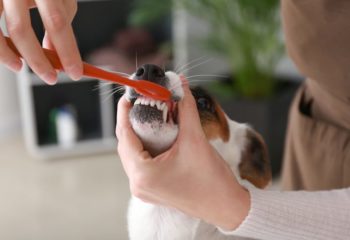According to the Journal of the American Animal Hospital Association (JAAHA), the term “senior” can describe an aging pet, but the number of years a pet is considered to be “senior” differs according to breed and size. As the owner of a senior dog, you’ve probably noticed that your best friend is taking life a little easier. Senior dogs are generally less active than they used to be, and instead of bounding across the lawn after a ball or a stick, your best friend might lumber a bit slower, taking his time. A few years can make a big difference
Read More
How Often Should I Brush My Dog’s Teeth in Monroeville, PA?
Keeping your dog’s teeth clean along with oral hygiene is another aspect of your dog’s health that’s as equally important as a healthy diet and regular check-ups with your veterinarian. According to the American Veterinary Dental College (AVDC), many dogs show signs of periodontal disease by the age of three. Periodontal, or gum disease, is an infection of the tissues that hold the teeth in place. The first sign of periodontal disease is bad breath, which often goes unnoticed by owners because we expect dogs to have bad breath. Periodontal disease can cause some serious health issues for your best
Read More
Top 5 Reasons to Spay or Neuter Your Dog and Cat in Monroeville, PA
Spaying or neutering your dog or cat in Monroeville, PA is an important decision. There are many benefits to getting your cat and dog neutered or spayed. So, what exactly is spaying and neutering? Spaying is a procedure that females undergo to remove the ovaries and uterus. Neutering is a procedure that males undergo to remove the testicles. The goal of both procedures is to stop reproduction. They are both simple and your pet will be in and out the same day. The typical recovery time is a few hours for the anesthesia to wear off and then a few
Read More




